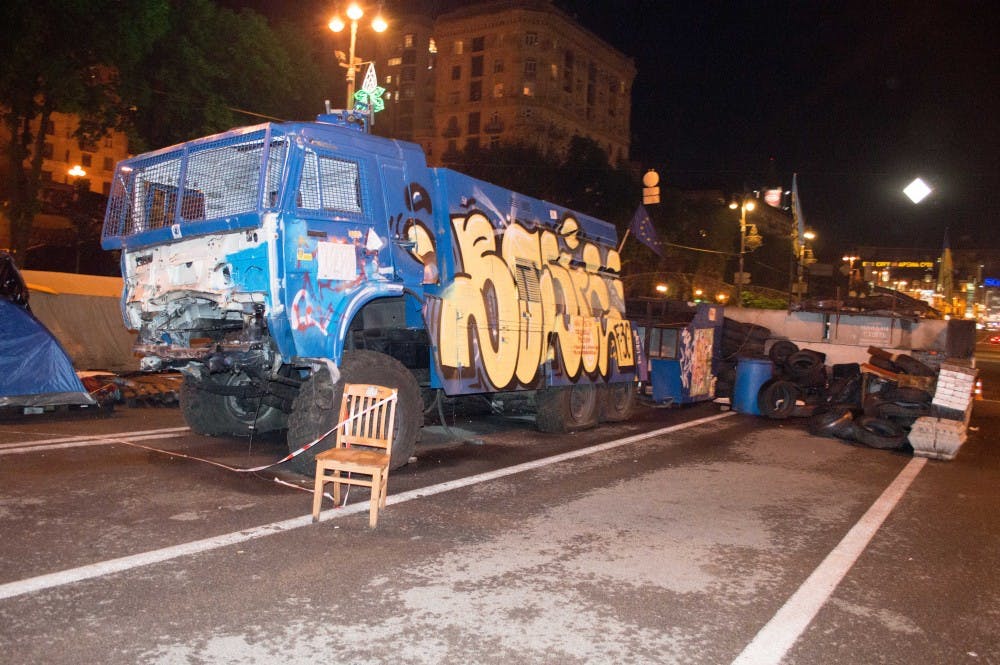Photo: A police vehicle, taken over by Euromaidan protesters during clashes in February near Kiev’s Maidan square. Photo by Trey Yingst.
AU student Trey Yingst is currently in Ukraine to report on upcoming elections and ongoing violence for News2share.com. The Eagle will be posting daily correspondence. Click here for the next update and here for the previous update.
On May 22 and 23, Trey Yingst talked to a presidential candidate who blamed Kiev for a lack of action in the country’s east and warned of additional protests if the government continued to disappoint.
Yingst interviewed Dmytro Yarosh, a candidate in Ukraine’s upcoming presidential elections and leader of ultra-nationalist party Pravy Sektor.
Yingst has been reporting from Ukraine about the country’s upcoming elections and ongoing violence since May 21.
Yarosh was a supporter of the Euromaidan protests, viewing them as a step towards ending Russian influence in Ukraine, according to his comments at the Ukraine Crisis Media Center on May 22.
Yarosh said that Pravy Sektor could return to the streets if whoever is elected on Sunday fails to appease Ukraine’s people.
“I would suggest that it could begin a third stage of revolution,” Yarosh said, “because whoever comes to power could be taken out of power for their actions.”
Yarosh also blamed the interim Ukrainian government for sending unprepared soldiers to fight in the East and said that the deaths of several Ukrainian soldiers in the past weeks could have been prevented.
“For now the fighting is still going on, but it’s a beating that the current Ukrainian government isn’t helping them,” he said. “They act a little bit slowly, and they just don’t give them enough support.”
In Maidan, Trey spoke to two Euromaidan protesters about the violence they witnessed during the demonstrations.
Sergii Morgunov, a protester who demonstrated with the Euromaidan since it began in mid-November, was there when the first clashes with riot police broke out.
“We all came here [to Maidan] to say no to the government’s decision to cancel the European Union Association Agreement,” Morgunov said to Yingst, when protesters ran into a police blockade.
“We met a block of police who wouldn’t give us way,” he said. “The police started to throw [gas] grenades into the crowd of people, and after that, people started to be aggressive.”
Soon after, word started to go around that protesters had been killed amidst the gunfire.
“The government had crossed the edge,” Morgunov said. “For us, there wasn’t any solution except that they [the corrupt officials] go away from the parliament and government, forever.”
Protesters and police fought for months, until violence reached a climax in mid-February.
“On February 18, they used their guns and killed two people on Institutskaya [Street],” Morgunov said. “It was just a woman who wanted to protect people, and they killed her. It was inhuman.”
Yingst spoke with a woman who had been protesting on February 18 and was injured when fighting broke out between riot police and demonstrators in front of the Ukrainian parliament.
“They began to shoot from the roofs,” she said. “Snipers began to shoot. We tried to help our men, and we took stones from the floor and tried to help them defend us and our independence square.”





